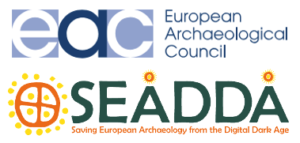 The EAC have released new Guidelines “Revisiting the Valletta Convention for the Digital Age: Position statement on archiving primary archaeological data” which are to be shared and used: https://doi.org/10.5281/zenodo.10695890. The topic of digital archiving has been addressed by both the EAC Working Group for Archaeological Archives and the SEADDA COST Action and these Guidelines are a product of their close cooperation, based on the reviews and surveys done previously.
The EAC have released new Guidelines “Revisiting the Valletta Convention for the Digital Age: Position statement on archiving primary archaeological data” which are to be shared and used: https://doi.org/10.5281/zenodo.10695890. The topic of digital archiving has been addressed by both the EAC Working Group for Archaeological Archives and the SEADDA COST Action and these Guidelines are a product of their close cooperation, based on the reviews and surveys done previously.
Abstract of the guidelines:
“There is a significant disparity in the value of archaeological data and their handling within heritage management practice. This imbalance threatens the preservation of cultural heritage being continuously removed from the landscape and transformed into archives of (digital) archaeological documentation. To mitigate the risks, systemic changes are necessary. These changes require political decision-making to provide the resources, a clear framework, and the tools to create a sustainable and meaningful environment for archaeological archiving, leading to the highest possible social benefit.
“There is a significant disparity in the value of archaeological data and their handling within heritage management practice. This imbalance threatens the preservation of cultural heritage being continuously removed from the landscape and transformed into archives of (digital) archaeological documentation. To mitigate the risks, systemic changes are necessary. These changes require political decision-making to provide the resources, a clear framework, and the tools to create a sustainable and meaningful environment for archaeological archiving, leading to the highest possible social benefit.
The Archaeological Archives Working Group of the EAC proposes a set of basic principles for the handling of primary documentary archives and recommend practical measures to be taken in the legislative and organisational framework and derived archaeological practice. The proposed measures should be applied as widely as possible as a basic standard of care for archaeological cultural heritage.”

